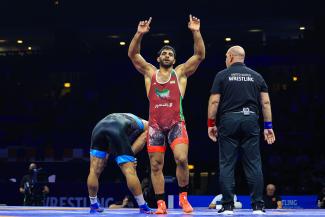Update to Calendar and Events for 2021
Thursday, September 24, 2020 - 15:44 By United World Wrestling Press

CORSIER-SUR-VEVEY, Switzerland (September 24) -- United World Wrestling has updated its event calendar for the 2021 season to reflect all recent adjustments made due to the impact of COVID-19 on a variety of international events.
The Continental Championships will be scheduled at the beginning of the year in order to add the Continental and World Qualifiers. Because the Senior Pan-American Continental Qualifiers were held last year, the Continental Championships will be held at the end of May.
The Continental Championships:
January 29-31: Oceania Championships, Pago Pago, ASA
February 02-07: African Championships, Marrakech, MAR
February 08-14: European Championships, Katowice, POL
February 16-21: Asian Championships, Almaty, KAZ
May 27-30: Pan-Am Championships, Rio de Janeiro, BRA
The Continental Olympic Qualifiers:
March 12-14: Africa and Oceania Olympic Qualifier, El Jadidda, MAR
March 18-21: European Olympic Qualifier, Budapest, HUN
March 26-28: Asia Olympic Qualifier, Xi'an, CHN
World Olympic Games Qualifier
April 29-May 02: Sofia, BUL
The Cadet World Championships were moved to the end of July as to not interfere with the Olympic Games. There will not be one full month between the Cadet Continental Championships and the Cadet World Championships, but the deadline linked with the registrations remains the same.
The newly announced Junior Pan-American Games will be also organized in 2021. The qualification event for the Games will be the Cadet Pan-American Championships which will have to be organized earlier in order to allow enough time for the registration/accreditation process. It was also agreed that Argentina will host cadet and junior Pan-American Championships at the same time in order to reduce the cost of the Federations.
Due to a postponement of the 2022 Youth Olympic Games, the Cadet Continental Championships in 2022 will once again be held at the end of June.
You can find the updated calendar at https://unitedworldwrestling.org/events).


Share your thoughts.
Comments